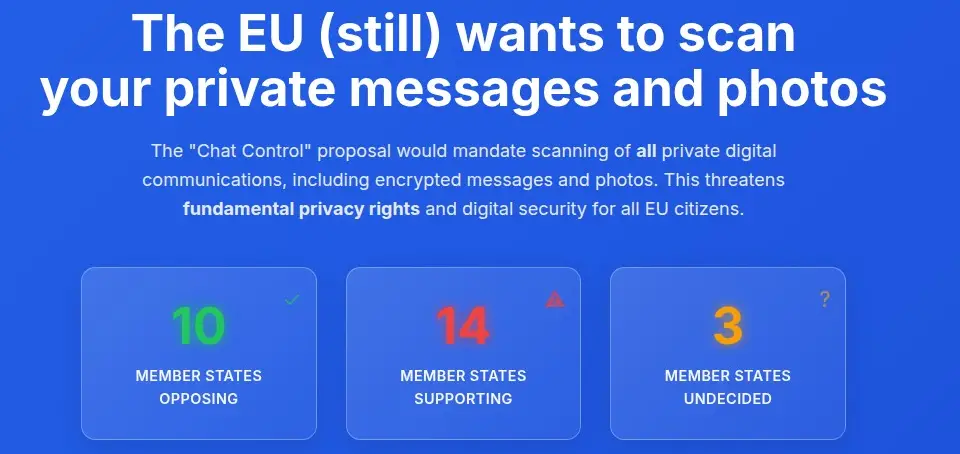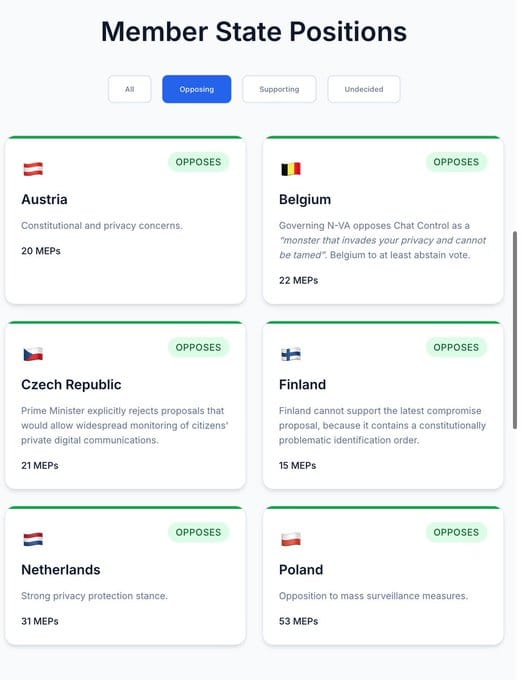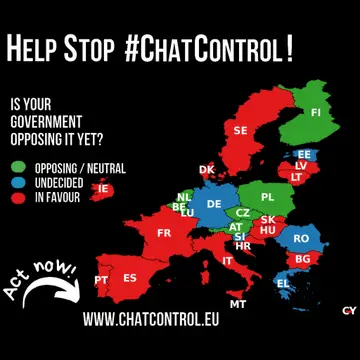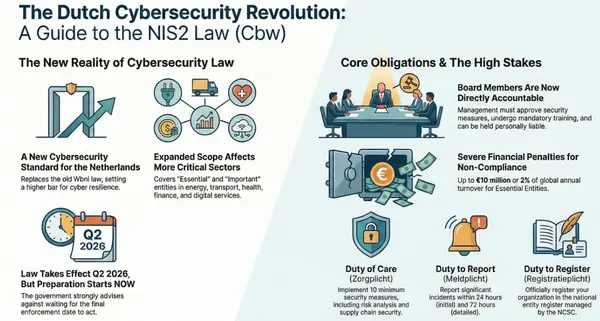EU Chat Control Fails Again: Blocking Minority Secured as Germany and Luxembourg Join Opposition

Bottom Line: The EU's controversial Chat Control proposal has failed for the third time after Germany and Luxembourg joined a blocking minority of nine member states opposing the Danish presidency's push for mandatory message scanning. Despite Denmark securing support from 14 countries, the opposition coalition now represents more than 35% of the EU population, effectively killing the October vote.

Executive Summary
On September 12, 2025, the European Union's most controversial digital surveillance proposal suffered another decisive defeat. The Danish presidency's attempt to resurrect the Child Sexual Abuse Material (CSAM) regulation—better known as "Chat Control"—collapsed when a blocking minority formed, led by Germany's last-minute decision to oppose mandatory encryption-breaking provisions.
For compliance professionals, this represents both a significant victory for digital privacy and a reminder of the ongoing regulatory uncertainty surrounding encrypted communications in Europe. The failure of the Danish proposal marks the third consecutive presidency unable to secure passage of mass surveillance legislation that would have fundamentally altered compliance obligations for technology companies.
Key Developments:
- Blocking minority formed: 9 countries now oppose, representing 35%+ of EU population
- Germany's decisive intervention: Berlin's opposition on encryption grounds tipped the balance
- Luxembourg joins resistance: Adding to the coalition against mandatory scanning
- Slovakia reportedly shifted: From supporter to opposition according to latest data
- No October vote: Denmark's presidency effectively abandoned its timeline

The Vote That Never Happened
The September 12 deadline that we previously identified as critical proved decisive—but not in the way Denmark had hoped. Instead of finalizing a position for an October 14 Council vote, member states made clear that no agreement would be possible.
The Blocking Minority: More Than Numbers
The formation of a blocking minority requires either:
- At least 4 member states representing more than 35% of the EU population, OR
- At least 13 member states (regardless of population)
Opposition Coalition (9 countries):
- Austria
- Belgium
- Czech Republic
- Finland
- Germany
- Luxembourg
- Netherlands
- Poland
- Slovakia
Germany's Federal Ministry of the Interior explained that they could not fully support the Danish position, specifically opposing measures that would break encryption. This position, confirmed in Bundestag Digital Committee meetings, proved decisive given Germany's 83 million citizens—representing approximately 19% of the EU's total population.
Countries Supporting (14):
- Bulgaria
- Croatia
- Cyprus
- Denmark
- France
- Hungary
- Ireland
- Italy
- Latvia
- Lithuania
- Malta
- Portugal
- Spain
- Sweden
Undecided (4):
- Estonia
- Greece
- Romania
- Slovenia

Germany's Encryption Red Line
Germany's intervention highlighted deep fractures among member states, with Berlin making it clear that protecting private communications is non-negotiable. The German position echoed the country's historical resistance to surveillance overreach, drawing on experiences with state monitoring under both Nazi and East German regimes.
The German Federal Ministry of Justice representative noted that "these are indeed very serious intrusions into privacy, so the question remains as to the extent of the intrusion" and confirmed they "could not fully support the Danish position".
This stance has particular significance given Germany's existing legal framework. The German Federal Constitutional Court has declared data retention illegal multiple times for being "disproportionate," making it highly likely that Chat Control would face successful constitutional challenges.
The Danish Presidency's Failed Strategy
Denmark assumed the EU presidency on July 1, 2025, with Chat Control as a declared "high priority." The Danish strategy involved several key elements:
Technical Compromises That Weren't Enough
The Danish proposal attempted to address opposition concerns through:
- "Vetted technologies" for scanning encrypted communications
- Risk-based classifications limiting scanning to "high risk" services
- Voluntary user consent mechanisms for scanning activation
However, technology experts argued these compromises were fundamentally flawed, with Session Technology Foundation president stating that "none of the technologies available achieve this standard – all client-side scanning technologies introduce new unmitigable risks".
The Lobbying Effort
Research has exposed the extensive lobbying effort behind Chat Control, including over $24 million invested by the Oak Foundation since 2019 through organizations like Ecpat, Brave, and PR agency Purpose. Despite this significant investment in advocacy, the fundamental technical and legal objections proved insurmountable.
Compliance Implications: What This Means Now
Immediate Impact
For compliance teams that have been preparing for potential Chat Control implementation, the September failure provides several immediate implications:
Regulatory Certainty: Organizations can proceed with current encryption and privacy frameworks without immediate concern about mandatory scanning requirements.
Investment Planning: Technology companies can continue investing in end-to-end encryption without regulatory uncertainty about future compliance conflicts.
International Coordination: The failure reduces pressure for similar legislation in other jurisdictions that often follow EU precedent.

Cross-Reference with Data Act Implementation
As detailed in our comprehensive Data Act compliance guide, September 12 also marked the implementation of the EU Data Act. The coinciding of these dates was significant—while Data Act implementation proceeded as planned, emphasizing user control and data portability, Chat Control's failure preserved the encryption foundations that make secure data transfers possible.
This creates a more coherent regulatory landscape where:
- Data Act empowers users with control over their data
- GDPR maintains strong privacy protections
- Encryption remains legally protected rather than mandatorily compromised
The Technical Reality: Why Opposition Grew
The False Positive Crisis
Recent data from German law enforcement revealed a staggering 48% error rate in CSAM detection systems in 2024, while Irish data showed that only 852 of 4,192 automated CSAM reports in 2022 involved illegal content—an accuracy rate of just 20%.
For compliance professionals, these numbers represent more than technical failures—they illustrate the operational nightmare that mandatory scanning would have created:
- Resource Drain: Handling false positives would consume enormous compliance resources
- Legal Liability: Organizations would face potential lawsuits from users wrongly flagged
- Reputational Damage: Trust in digital services would erode significantly
Scientific Consensus Against Mass Scanning
Over 500 of the world's leading cryptographers and security researchers from 34 countries delivered a devastating verdict on Chat Control, declaring it "technically infeasible" in an open letter published days before the September 12 meeting.
The scientific consensus emphasized that "existing research confirms that state-of-the-art detectors would yield unacceptably high false positive and false negative rates, making them unsuitable for large-scale detection campaigns at the scale of hundreds of millions of users".

Industry Response and Strategic Positioning
Platform Resistance Proved Decisive
Major messaging platforms maintained firm opposition throughout the Danish presidency:
Signal: Continued to threaten EU market exit rather than implement scanning
Telegram: Maintained pledges to leave rather than "undermine encryption with backdoors"
WhatsApp/Meta: Held firm on "no backdoors" policy despite regulatory pressure
Apple: Continued its post-2022 stance against client-side scanning
This industry unity, combined with technical expert opposition, demonstrated that the proposal faced implementation challenges beyond political resistance.
The Tuta Mail Legal Strategy
Encrypted email provider Tuta Mail had prepared a comprehensive legal strategy, with CEO stating "Should the CSA Regulation continue to move forward in its current form, we would be willing to defend people's right to privacy in court as we have done so before in Germany".
This readiness for legal challenges from privacy-focused companies created additional implementation uncertainty that likely influenced member state positions.
The Broader Digital Rights Context
Pattern of Surveillance Expansion
The Chat Control failure occurs within a broader context of digital surveillance expansion across Europe, as we've documented in our analysis of Italy's problematic Piracy Shield system and cross-border regulatory pressures.
The Danish failure represents a significant victory for privacy advocates who have been fighting interconnected battles against:
- Automated content blocking (Italy's Piracy Shield overreach)
- Age verification requirements (UK Online Safety Act implementation)
- Encryption backdoors (Chat Control's scanning mandates)
Global Implications
The EU's failure to implement mass surveillance also affects global regulatory trends. The "Brussels Effect" typically sees EU regulations adopted worldwide, but Chat Control's failure reduces pressure for similar legislation in other jurisdictions.
This is particularly significant for:
- US platforms operating globally that would have faced EU-specific scanning requirements
- Developing countries that often adopt EU regulatory frameworks
- International encryption standards that would have been undermined by EU precedent
What Comes Next: The Future of Chat Control
Likelihood of Return
Based on historical patterns, Chat Control will likely return under a future presidency. The proposal has already survived multiple rejections, with Danish Presidency putting it "back on the table" after the December 2024 failure.
However, several factors suggest future attempts may face even greater challenges:
Constitutional Constraints: Legal experts increasingly view mass scanning as incompatible with EU fundamental rights
Technical Opposition: The scientific consensus against implementation has strengthened
Political Precedent: The blocking minority demonstrates sustained cross-party opposition
Industry Resistance: Major platforms have proven willing to exit markets rather than comply
Strategic Recommendations for Compliance Teams
Immediate Actions:
- Monitor Future Presidencies: Track which countries assume the rotating presidency and their digital surveillance priorities
- Strengthen Encryption Practices: Use the regulatory breathing room to implement stronger privacy protections
- Document Opposition Arguments: Maintain records of technical, legal, and operational arguments against mass scanning
Medium-Term Planning:
- Scenario Preparation: Develop response strategies for if Chat Control returns in modified form
- Legal Strategy Development: Consider joining industry coalitions for potential legal challenges
- Technical Infrastructure: Invest in privacy-preserving technologies that resist surveillance pressure
Long-Term Strategy:
- Policy Engagement: Participate in digital rights advocacy to prevent future surveillance proposals
- International Coordination: Work with global partners to resist the spread of mass scanning requirements
- Innovation Investment: Develop technologies that make surveillance technically infeasible rather than just legally prohibited
Conclusion: A Victory with Continuing Vigilance Required
The September 12 failure of Chat Control represents the most significant victory for digital privacy advocates since the original proposal emerged in 2022. The formation of a blocking minority led by Germany's firm stance on encryption demonstrates that surveillance overreach can be stopped when technical experts, civil society, and industry unite against disproportionate measures.
For compliance professionals, this outcome provides crucial regulatory certainty while highlighting the need for continued vigilance. As one observer noted, "Don't get tired. They will absolutely come again"—a reminder that the fight for digital privacy requires sustained engagement rather than celebration of individual victories.
The confluence of events on September 12—Chat Control's failure alongside successful Data Act implementation—points toward a European digital regulatory framework that can enhance user rights and child protection without sacrificing fundamental privacy principles. For organizations building compliance strategies, this suggests that investing in privacy-preserving technologies remains both ethically sound and strategically wise.
Key Takeaways for Compliance Teams:
- Blocking minority secured: Current Chat Control iteration effectively dead
- Encryption protection maintained: No immediate mandatory scanning requirements
- Regulatory coherence improved: Data Act implementation proceeds without privacy conflicts
- Future vigilance required: Surveillance proposals will return under different forms
- Industry unity matters: Technical and legal opposition proved decisive
The September 12 deadline that we identified as critical in our previous analysis indeed proved to be a turning point—just not the one Denmark had hoped for. Instead of ushering in an era of mass surveillance, it demonstrated that European democracy still contains effective safeguards against disproportionate security measures.
As we continue monitoring developments in digital privacy regulation, this victory serves as both celebration and reminder: the price of digital freedom is eternal vigilance, and the technical community's united opposition to surveillance overreach remains democracy's most effective defense against authoritarian technology policies.
This analysis builds on our previous coverage including EU Chat Control: Opposition Grows as September 12 Deadline Looms and EU Chat Control: Final Hours Before September 12 Deadline. For ongoing updates on European digital privacy regulations, continue following our compliance analysis.










